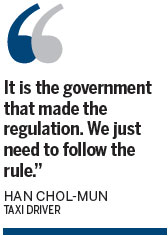Pyongyang keeps half its taxis off road at a time
Car bans are common worldwide to ease traffic and air pollution, and there are always exceptions for taxis.
But in Pyongyang, capital of the Democratic People's Republic of Korea, a strict odd-even ban has been imposed on most taxis since April.
Taxis with odd numbers at the end of their license plates are allowed to travel on odd-numbered days only, and those with an even number are able to drive only on even-numbered days.
The reason for introducing the license plate restriction for taxis remains unknown.
"It is the government that made the regulation. We just need to follow the rule," said Han Chol-mun, a cabdriver in Pyongyang.
In fact, a large number of new vehicles have been put on the roads in Pyongyang to boost taxi services since Kim Jong-un became the top leader of the DPRK in 2011.
Official figures showed more than 1,500 taxis were running in the capital city at the end of 2013.
Just a few years ago, the taxi industry in Pyongyang was far less regulated, and cabs could be all kinds of vehicles, including cars and minibuses, without a unified look.
Now a vast majority of the taxi cabs are Chinese-made BYD automobiles with the name of taxi firms printed on both sides of the cars. Atop the car body is fixed a board that says "Taxi" in both Korean and English.
Jumping into a cab and traveling 2 km or less costs $2. For each kilometer you travel beyond that distance, 56 US cents is added to the fare. Currencies from the US, EU, China and the DPRK are accepted.

Taximeters are not fitted in most cars; even if a taximeter is installed, the driver tends not to activate the machine unless you insist. It seems customary to negotiate with the driver about the fare.
For an extra $2 to $3, you can book a taxi in advance by dialing drivers' personal phone numbers. But foreign visitors have no access to the service because SIM cards sold to foreigners cannot connect to DPRK citizens' cellphones.
In Pyongyang, most citizens choose public transportation - subway, buses and trams - because of low ticket prices. A bus or subway ticket costs only 5 DPRK won (4 US cents).
The odd-even rationing policy, however, is not applicable for all cabs, taxi drivers told Xinhua.
About 150 taxis operated by Air Koryo, the national flag carrier and the country's only airline, are not subject to this regulation.
"We are the only taxi firm not asked to follow the ban," said a cabdriver under Air Koryo who gave his surname as Kim. "This is thanks to the special care given by our respected marshal."
(China Daily 12/05/2014 page10)














